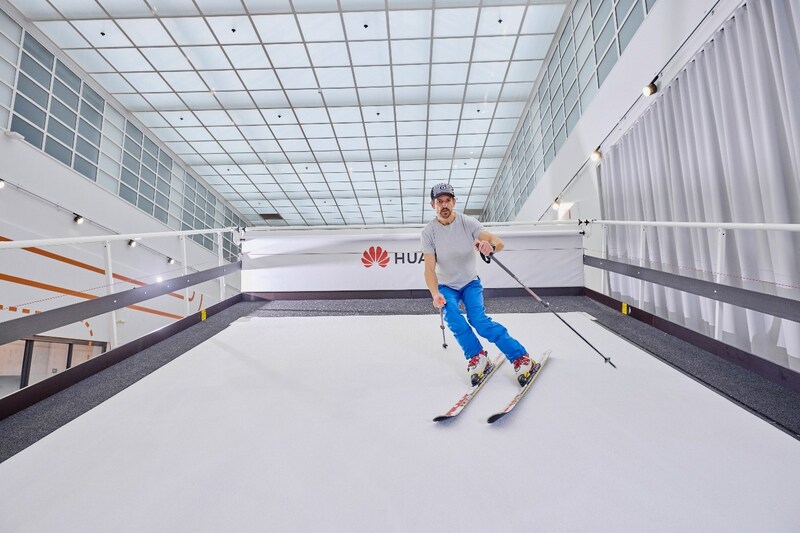Huawei launched a new HUAWEI Health Lab located in Helsinki, Finland. Equipped with state-of-the-art testing equipment, the laboratory serves as the research platforms for Huawei’s health & fitness sector.
Sized at almost 1000 square metres, the laboratory is equipped with a diverse range of world class sports equipment covering over 20 types of sports. Each area will showcase Huawei’s wearable sports and fitness algorithms in real life applications. At the same time, these will serve as open research platforms that contribute to technological research, detection and verification, standards R&D and industry incubation.
Advancing the Global Field of Sports Science and Health Research
Acknowledging the growing need in the health and fitness market, Huawei has pledged to deepen its research in health monitoring algorithms through its wearable technologies. This led to the establishment of three HUAWEI Health Labs across the globe since 2016: Xi’an and Songshan Lakes in China, and now one in Helsinki of Finland.
HUAWEI Health Lab in Finland is staffed with a multidisciplinary scientific research team comprising of 6 Doctors in Science (PhD), 20 experts from 5 major fields – physiology, AI, machine learning, software testing, and software engineering – across 7 EU countries. This assures that every area of sports and health research reaches the world’s advanced standards.
World-Class Sports Simulation Testing Facilities
The laboratory built true-to-life sports environments and scenarios in 5 major testing areas covering more than 20 sports and tracking over 200 physiological and biomechanical indicators. Participants will also be monitored while using Huawei’s latest wearable devices, such as the HUAWEI WATCH GT 4. The main 5 areas include a counter-current pool, a ski simulator, a multi-functional treadmill, an instrumented treadmill, and an open gym area comprising of various cardiovascular workouts.
Huawei built its very own counter-current pool based on professional standards, ensuring that swimmers can be accurately assessed on their swimming performance. The pool is equipped with dynamic water jets that can produce a controllable current flow rate up to 350 m3/hour and also allows the modification of water temperature and quality.
As skiing remains one of the most popular sports in Europe, the lab has introduced a ski simulator with adjustable speed, incline, and interactive routes and poles. The simulator is also built with sensors that detect the user’s speed, position, carving angles, forces, and performance data.
The multi-functional treadmill can test running, cycling, wheelchair racing etc., with speeds adjustable up to 50km/h. The treadmill can even import GPX data from GPS devices to simulate real-world terrains and routes, giving participants true-to-life scenarios that will more accurately put their running/cycling skills to the test. The camera then detects their performance scientifically, providing immediate feedback to allow technique improvement in real-time.
Joining Hands with European Health Institutions and Research Groups, including EU’s Cardiovascular Health Study
To truly improve consumers’ lives through innovative sports and health technologies, Huawei has actively collaborated with local Finnish institutions and regional European experts.
iCARE4CVD is part of the IHI (Innovative Health Initiative) program which brings together medical and technology industry and the European Union, one of the most ambitious research initiatives in the area of artificial intelligence and cardiovascular disease. Huawei is currently the only wearable device manufacturer to participate in iCARE4CVD, and will co-lead the work package that will develop methods to improve patient motivation.
Huawei has co-founded Interlive consortium with 6 top European universities with one of the most scientific and rigorous testing standards for wearable devices, the consortium strives towards developing best-practice recommendations for consumer wearables to measure direct and derived metrics. The partnership has further cemented Huawei’s wearable technology reliability and will ensure the continued scientific validity of Huawei wearables based on four standards: heart rate, step counts, caloric expenditure and VO2 Max (maximum oxygen intake).
Currently, Huawei plans to pursue research cooperation with European universities and disability health centres to further its research into the needs of users with disabilities. By understanding the sports and fitness management needs of wheelchair users and uncovering more solutions, users can look forward to a more dynamic sports health and performance monitoring technology in Huawei’s future smart wearables.
Protecting the Data Confidentiality of all Research Participants
Huawei has formulated strict privacy and security principles for its wearables. While the company remains openly collaborative with partners in the Healthcare and Sports ecosystem, it ensures that these partnerships are carried out with full compliance to data privacy causes. This means that every step of the research process – which includes data collection, authorisation, transmission, and storage – complies strictly with privacy and security principles.
Photo – https://mma.prnewswire.com/media/2261046/Ski_simulator_Huawei_s_Health_Lab_Finland.jpg
